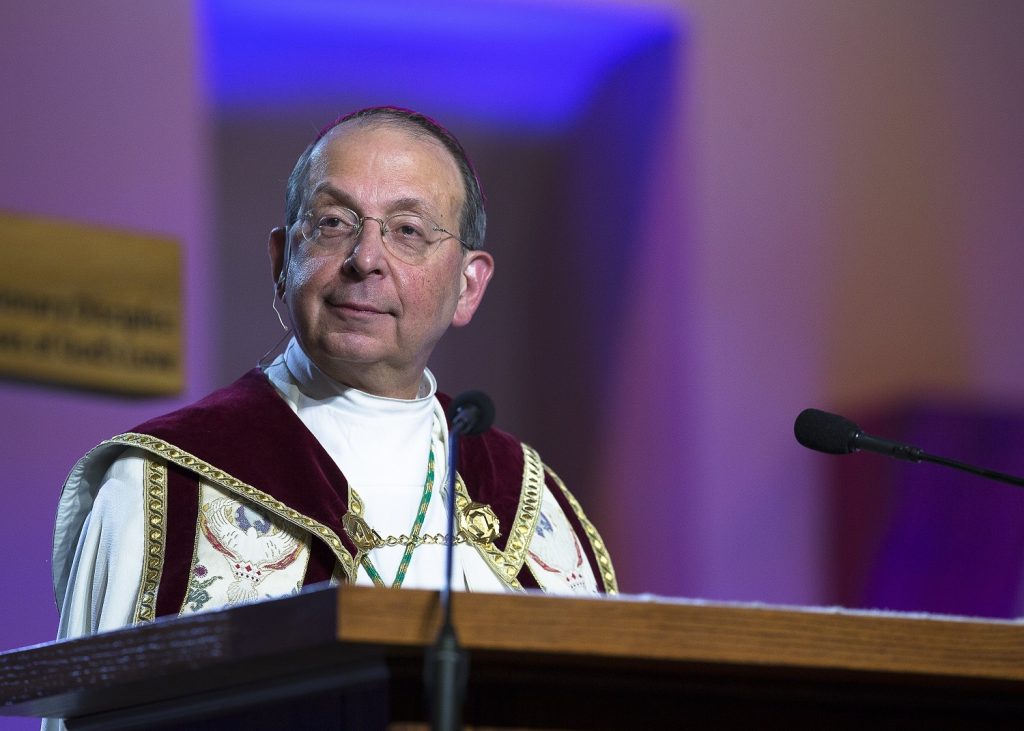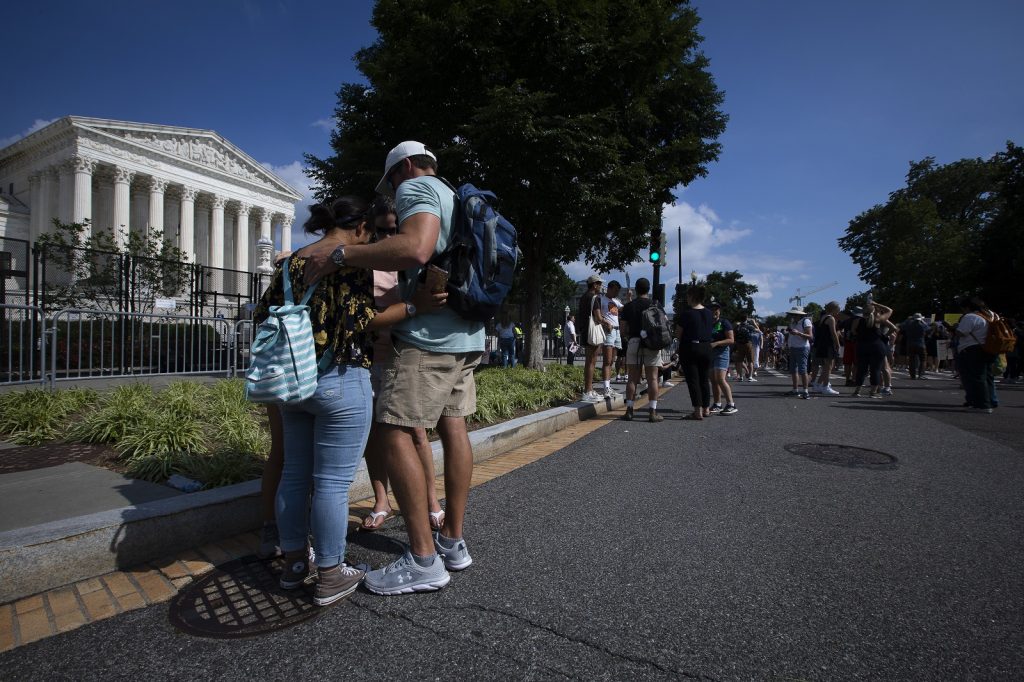
by Julie Asher
WASHINGTON (CNS) — The U.S. Supreme Court overturning Roe v. Wade is “tremendously important” for the nation and the cause of life, but it’s not “a day simply for celebration,” said the chairman of the U.S. bishops’ Committee on Pro-Life Activities.
“As happy as we may be over this decision,” Baltimore Archbishop William E. Lori said, “I think it is also important for us to recognize our need, our obligation to redouble our efforts to help women in difficult pregnancies.”
The archbishop made the comments in an interview via Zoom shortly after the court handed down its ruling June 24.
Joining him were Danielle Brown, associate director of the U.S. Conference of Catholic Bishops’ Ad Hoc Committee Against Racism; Dr. Kathleen Raviele, a retired OB-GYN; and Dr. Grazie Pozo Christie, a radiologist, columnist and senior adviser to The Catholic Association.
In a 5-4 vote, the high court overturned its landmark Roe v. Wade ruling, which legalized abortion nationwide in 1973.
The reversal is something many “worked very hard for and prayed very hard for” over the last nearly 50 years, the archbishop said.
The Catholic Church’s efforts to assist women facing difficult or unplanned pregnancies, Archbishop Lori noted, include the Gabriel Network and other affiliates of the Gabriel Project, pro-life pregnancy centers, and the “tremendous services” offered by Catholic Charities across the U.S. and Catholic health care.
In addition, the U.S. bishops in 2020 launched a new initiative called “Walking with Moms in Need,” which aims to engage every Catholic parish “in providing a safety net to ensure that pregnant and parenting moms have the resources, love and support they need to nurture the lives of their children.”
It’s “an opportunity for parishioners to come to know women in difficult pregnancies know what they need and link them to services they, the parishioners, can provide,” the archbishop explained, saying it’s “really taking off” in many parishes.
Asked about the claim the U.S. Catholic bishops are focused on the single issue of abortion to the exclusion of other social justice issues, Archbishop Lori said: “Hardly. The church has a beautiful legacy of social teaching and we live that social teaching every day, not perfectly, [but] we are not simply people who issue statements on issues.”
“We are a people who serve and the church is serving immigrants at the border, the church is educating deserving young people in our inner cities, the church is providing massive amounts of charitable and health care, the church is working to limit gun violence,” he said.
“The church has a beautiful vision of the dignity of human life from conception until natural death,” he continued. “In the case of abortion and this decision that we are focusing on today, the church’s admonition and advice to everyone is to love both the mother and the child, to focus on the needs of the mother as well as protecting the life of the child.”

Another challenge that remains in a post-Roe society is changing hearts and minds about abortion, which Brown which is not unlike what she and others are doing in their work to implement the bishops’ 2018 pastoral on racism, “Open Wide Our Hearts,” in parishes across the country.
Brown called the Roe reversal “a historic moment” and “just like our country was able to move away from the devastating and horrific” slave trade, the nation can “move away from the culture of death.”
“The slave trade is not the same as abortion but there are commonalities,” she said.
“We have to understand and agree the death of a person is a tragic and sad situation. We are not made for death, we are made for life,” Brown said. “Any loss of life is one to mourn.”
“We believe in conversion, conversion in Christ,” she said. Bringing people to “a conversion of the heart” can be “a long journey” but “we know that conversion can happen.
“When people are challenged on their views of abortion and are given the opportunity to think deeply and to answer simple and critical questions about what life is and the importance of it, we know that conversion can happen. . . . We see that every day in our work against racism.”
“The bishops see these two issues intrinsically enmeshed together. They stated in the pastoral that racism is a life issue,” Brown said, adding that “people of color have been disproportionately affected by poverty, targeted for abortion, have less access to health care and [account for] the greatest number on death row.”
Echoing Brown, Archbishop Lori said, “It is a day to ask for God’s help in winning minds and hearts to understand and to accept the precious gift of life from the moment of conception onward and to create the kind of conditions in society where no mother feels she has to choose between her future and the life of her child.
“When [St.] John Paul II spoke about a culture of life, I’m pretty sure that’s what he meant.”
Raviele thinks “many women will be relieved now that abortion is not on the table as one of the options they have to consider when they’re in an unwanted pregnancy or an unplanned pregnancy.”
“Women really have been deceived over the last 50 years, but since it (abortion) was legal, they thought that it was OK, and now they’re being given permission to actually be a mother and have their children,” she said.
“The scientific advances we’ve had over the past 49 years have clearly shown this is not a clump of cells in the woman’s uterus,” Raviele added. “It is a very small human person that is developing that requires her love and attention to develop.”
As an adoptive mother, Christie noted the importance of continuing to spread the message that “Adoption is the loving option” — “like we say on all the marches.” She and her husband have four biological children and their fifth child is adopted.
“We need to keep holding that up before people and say every child conceived is conceived for a purpose, is loved into being and we can find a beautiful home for this child. Not to worry,” she said. “Death is not the answer for a child that comes with complications, and let’s face it, what child doesn’t come with complications?”
The reversal of Roe is “a new dawn for America,” said Christie. “It’s wonderful we don’t have to say any more that there’s a constitutional right to destroy a child, that pits a woman against her own children.
“America is a new nation starting today and today is the day we roll up our sleeves and we make her more beautiful each and every day that dawns.”
The nation “will go through a very difficult period” and “there is already a great deal of anger” among opponents of the court reversing Roe, Archbishop Lori said.
“Sometimes it is hard to break through the anger, but I think that this is a moment for prayer, sustained prayer,” he said. “It’s a moment for us to remain calm and loving and focused on mothers and their needs.”
“The best chance of winning minds and hearts” is to show the church focuses “both on the mother and the child,” he said.
“I would love to think we would win them all but I think this is something we have to work at,” he added. “We have to demonstrate that the pro-life movement at its best is about love, care and compassion. [We need to] put that contrast out there — not self-righteously but humbly and in the spirit of service.”






